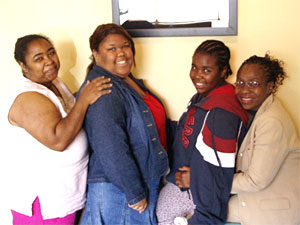|
Photos
|
July 2, 2005
 |
| Tchaikovsky Rogers, her daugher Julia Sewell, Thandisizwe Jackson-Nisan and her mother Jewelean Jackson (Brandt Williams) |
Minneapolis, Minn. — Two weeks before 17-year-old Julia Sewell and 15-year-old Thandisizwe Jackson-Nisan leave for Great Britain, they've come to a north Minneapolis coffeeshop with their mothers to talk about the Youth Leaders International program. Thandisizwe's cousin, the third member of the delegation is not here.
Sewell says the program encourages them to work in their communities and make global contacts.
"That's when we're put into contact with people from across the world," says Sewell. "We also have to do a mentor assignment which is where we get youth from our community and help them out. And there's academic and cultural -- things of that nature. And also we just do a number of activities that keep us engaged in the program."
Thandisizwe Jackson-Nisan says she finds the program assignments challenging and fulfilling. But she says when they met their colleagues in the program for the first time at a conference in Washington D.C., she felt like people were looking down at her.
"We weren't the only black people -- because there were other Africans -- but we were the only black people from the United States, and I think a lot of the people at the conference thought that we weren't capable of doing what everybody else did," she says.
The girls say their counterparts were from priviledged families. The program pays for all expenses except airfare. However, Sewell says on a trip to France, some of the kids' parents gave them a few thousand dollars for shopping sprees.
The Minneapolis group may not have rich parents, but they do have very supportive parents. Jewelean Jackson is Thandisizwe's mother. She took care of getting the students registered for the program and has played an active role in raising the money needed for the students' travel.
Jackson says they started with six teenagers but some left the program.
"Between the schedules and this feeling that we're never going to be good enough that kind of grates on you sometimes," says Jackson. "And I know one of the other young women -- they just finally said, 'We're tired of trying to prove to them that we are.' And I was saddened, because, 'You're almost there.' This is six months to graduation."
Youth Leaders International is a non-profit organization based in Rockville, Maryland. Executive Director Mike Dixon praised the hard work and enthusiasm of the Minneapolis group. And he says he doesn't think they have been treated any differently because of their race.
"We also have a chapter in Kenya," says Dixon. "And those students come from Nairobi which of course is the capitol and I guess would be considered inner city kids as well. It was very interesting to see how response would be of a black student from America as opposed to a black student from Kenya. I really couldn't tell any difference."
Of course the pervasive images of young black Americans that appear on televisions throughout the world -- whether as rap artists, athletes or criminals -- shape world opinion. Julia Sewell says she thinks their presence in the program helped change some of those stereotypes.
"I think before we went over there, people were like, the French have this view of Americans of being uppity and wealthy and not contributing," says Sewell. "But I think we helped to break down that barrier by even being in the program. So I think that knowledge helped them to see that we're not the typical Americans."
Both girls have big plans for the future.
Sewell wants to become a pediatrician. Thandisizwe Jackson-Nisan wants to be the first black woman president of the United States.



